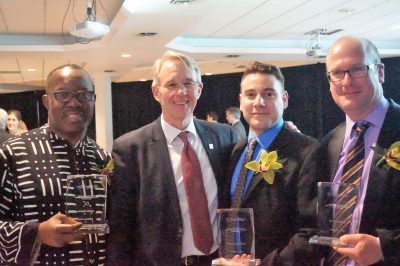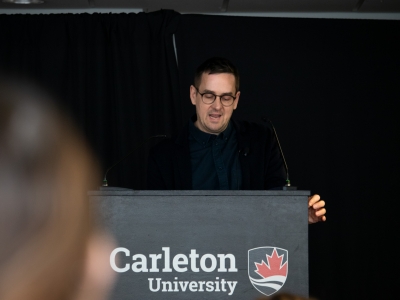
Capital Educators’ Awards: (From L to R) Professor Nduka Otiono, Provost Peter Ricketts, Professor Christopher Dieni and Professor Martin Geiger.
At the start of each semester, Assistant Professor Martin Geiger sends out an email to his students, inviting them to join a research collective on migration and refugee issues. This collective serves as an outlet in which students are encouraged to conduct research with emerging scholars and fellow students at both the undergraduate and graduate level.
“They sometimes think I’ve emailed and invited them by mistake,” says Professor Geiger, who clearly enjoys their reaction. “But I tell them I’m not only looking for good transcripts: I’m looking for students who are passionate about the subject matter, have a desire to embark on research and collaborate with others, even in other parts of the world.”
Two years ago, Professor Geiger, who is cross-appointed to the Department of Political Science and the Institute for European, Russian and Eurasian Studies, initiated the Mobility & Politics Research Collective (or “MobPoli” for short). At present, MobiPoli is a 70-member strong transnational research group based out of Carleton University. It brings together emerging scholars, practitioners, and students from Ottawa, other places in Canada, and from as far as Egypt and Brazil.
Professor Geiger’s efforts to combine teaching with research recently won him a Capital Educators’ Award, along with Assistant Professor Nduka Otiono from the Institute of African Studies. They were among 18 winners who were selected from a pool of 63 finalists.
Tatheer Ali, B.A (Public Affairs and Policy Management), recently represented Carleton University and the collective at the National Council on Undergraduate Research Conference in the U.S. She was among those who nominated Professor Geiger for the award.
“Students in Dr. Geiger’s classes are always engaged with the material and left feeling intrigued and curious about topics related to migration,” she says. “He has created a support group of students who work with each other on private and collaborative research.”
For Dr. Geiger, teaching and research are “completely interdependent” and reinforce each other. His teaching typically goes far beyond traditional classroom lectures.
“We all work together as a team—writing grant applications, conducting research, attending and presenting at conferences. It’s a group learning approach, similar in concept to a research lab and distinctive within the social sciences at Canadian universities,” says Professor Geiger, who draws on his experiences with teaching in other contexts, including Germany. “I couldn’t teach this way if I wasn’t an active researcher. Also, while my teaching doesn’t work without research, my research doesn’t work without teaching.”
His joint research and the community outreach activities of Mobility & Politics are partially supported by a grant from the Social Sciences and Humanities Research Council (SSHRC). Collaborators in the group have also received i-cureus program awards and summer internship awards provided by Carleton University.
Jay Ramasubramanyam, a new PhD student in the Department of Law and Legal Studies, says Professor Geiger and “MobPoli” have had already a strong influence on his academic career.
“He has been very generous in offering me opportunities in collaborative research projects, and suggesting me to apply for funding to different programs” says Ramasubramanyam. “We need more people to build the student-professor bridge and Martin is definitely one of them.”
Friday, June 3, 2016 in Department of Political Science, Institute of European, Russian, and Eurasian Studies, International, News
Share: Twitter, Facebook



